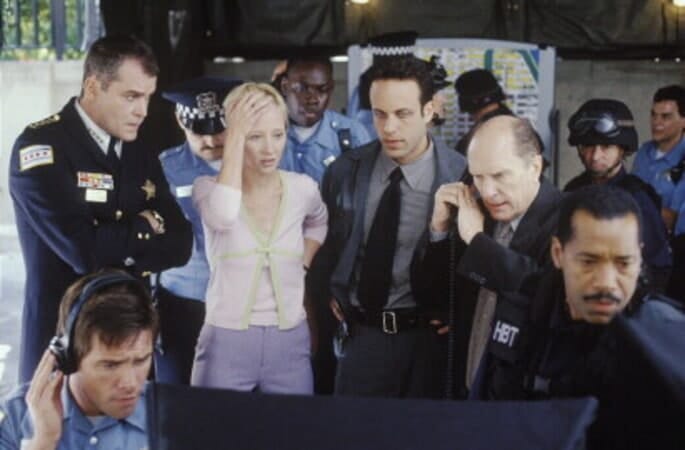Have You Watched “John Q” Recently?

Denzel Washington’s powerful performance in John Q, makes one think about the current state of healthcare in the U.S. The movie, released by New Line Cinema in 2002, tells the story of a desperate father who takes drastic measures to save his son’s life after being told that he needs an emergency heart transplant that his insurance won’t cover. This fictional tale came to mind with the recent incident in NYC where the CEO of UnitedHealthcare was fatally shot in what is being called a “targeted incident.”
John Q. Archibald (Denzel Washington) is an ordinary man whose life revolves around his family. His wife Denise (Kimberly Elise) and young son Michael (Daniel E. Smith) are his world. But when Michael falls seriously ill and needs an emergency heart transplant operation that John Q. can’t afford and his health insurance won’t cover, he vows to do whatever it will take to keep his son alive.
With time and options running out, a desperate gamble becomes his only hope—he takes the hospital emergency room hostage.
John Q is more than just a dramatic film; it’s a commentary on the flaws in our healthcare system.

The movie highlights the struggles faced by ordinary people who are forced to navigate an opaque and often hostile system that prioritizes profits over people. As John Q, played by Denzel Washington, navigates the treacherous waters of the hospital emergency room, he faces off against veteran police negotiators and quick-tempered police chiefs who seem more interested in maintaining order than in helping those in need.
One of the most striking aspects of John Q is its portrayal of a healthcare system that has lost sight of its purpose. In the movie, patients are treated like statistics, not human beings with lives to save. Doctors and hospital administrators are more concerned with billing and insurance than with providing care. It’s a stark reminder of how far we’ve strayed from the original promise of healthcare: to provide medical care that is accessible, affordable, and available to all.

So what can we learn from John Q?
Firstly, it’s clear that our current system is in dire need of reform. The fact that a CEO like Brian Kelley was targeted in what is presumably a drastic action to protest the lack of transparency, focus on health outcomes, and accountability in our healthcare system speaks volumes about the urgency of change.
But how do we bring about a change in healthcare so more stories like this don’t end up happening? One way is through public pressure. We can start by demanding more from our elected officials. We need politicians who are committed to creating a healthcare system that prioritizes people over profits. This means supporting policies like Medicare for All, public option plans, and increased funding for community health clinics.

We also need to hold corporations like UnitedHealthcare accountable for their actions. Will Kelley’s murder spark widespread outrage and calls for reform? Time will tell. We can use our voices to form public pressure and demand greater transparency and accountability from companies like UnitedHealthcare and others. We can also support organizations that are working to create a more equitable healthcare system.
Another way to effect change is through grassroots activism. We can start by educating ourselves about the issues affecting our communities. We can learn about the struggles faced by patients with chronic illnesses, the lack of access to mental health services, and the devastating consequences of medical bankruptcies. By sharing our knowledge with others, we can build a movement that demands change.

Healthcare should be seen as a fundamental human right, not a commodity that can be bought and sold.
My own father died decades earlier than he should have had he been allowed to access appropriate preventative healthcare before things got bad. He was unable to do so because the system we have had for decades unfairly baits workers into staying at jobs that provide healthcare (sometimes at abhorrently poor levels) instead of guaranteeing respectable levels of healthcare for all citizens.
Finally, we need to support organizations that are working tirelessly to create a more just healthcare system. From advocacy groups like the National Organization for Women (NOW) and Planned Parenthood to community-based initiatives like the Community Health Worker Program and non-profits like the Human Rights Campaign, there are countless organizations doing vital work to promote health equity and access.
As we move forward, it’s essential to remember that creating change takes time, effort, and perseverance. We’ll face setbacks and obstacles along the way, but with persistence and determination, we can build a healthcare system that truly puts people first.

In the words of John Q, “You gotta be willing to take risks.”
It’s time for us to take action, to demand better from our government officials, corporations, and healthcare system. The future of healthcare is in our hands, and together, we can create a system that truly serves humanity.
Use my affiliate link to watch John Q on Amazon Prime.
Find out more about John Q from the official movie site: https://www.warnerbros.com/movies/john-q
Have you seen the movie? What did you think? Let me know in the comments or on social.
